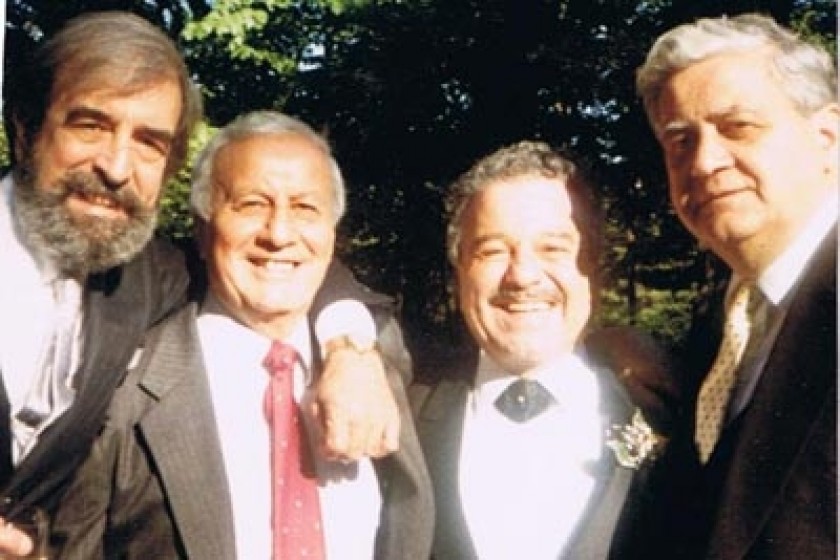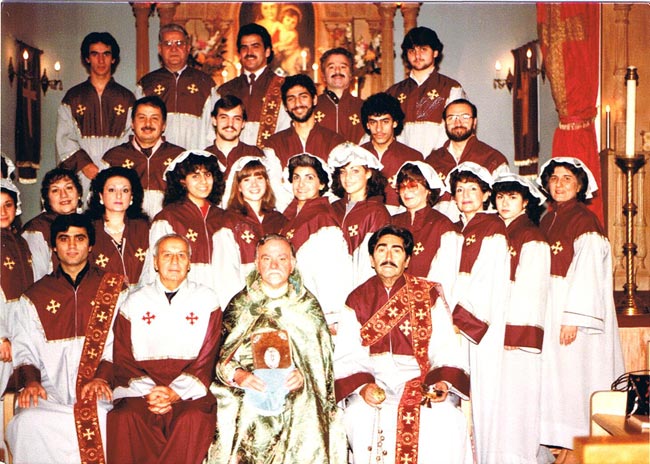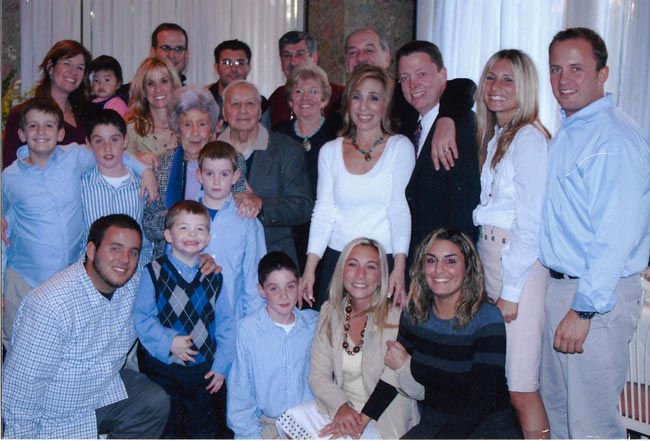
In Memoriam: Armen Babamian
By Charles and Lucine Kasbarian
Armen Babamian was a leading guardian of our nation's musical heritage in the Armenian Diaspora. He has bridged Armenian musical customs from the past into the present to instruct countless Armenian-American community choirs. In Ridgefield, New Jersey, he was instrumental in establishing one of the most harmonious Armenian choirs in the United States -- a group which consisted of generations of Armenian Americans, young and old -- whom he trained to perform the traditional interpretation of our beloved Armenian Divine Liturgy.
Armen Babamian sang his first solo at the age of twelve in the Holy Cross Armenian Church of Union City, NJ. He was featured as tenor soloist in his junior and senior years in high school and subsequently studied voice with Manley Price Boone at the Metropolitan Opera Studios. Following an audition by director, Robert Shaw, Armen was accepted in the Collegiate Chorale, and qualified for the Varsity Choir and Shaw's CBS Radio Choir.
As an active member of the Armenian community, Armen sang tenor leads in operas and operettas such as Anoush, Arshin Mal Alan, and Gharabaghi Melikner. In addition, he joined the New Jersey Chorale and, as a featured tenor soloist for many years, performed lead roles in Oklahoma, Showboat, Annie, Get Your Gun,and the Gilbert & Sullivan operettas, Mikado, Pirates of Penzance, Ruddigore, and Trial by Jury. He has performed under the batons of orchestral conductors such as Leopold Stokowski, Sir Thomas Beecham, and Arturo Toscanini. He appeared with Fred Waring's Pennsylvanians and assisted Paul Robeson in the presentation of Ballad for Americans at Lewisohn Stadium in NY.
As a tribute to his Armenian heritage, Armen has specialized in performing the classical songs of the godfather of Armenian folk music, Gomidas Vartabed. He credits his "Varbed," Mihran Toumajan -- one of the famous "five" pupils of Gomidas -- for helping him to better appreciate the Master's musical genius. Toumajan declared Armen to be the foremost American-born interpreter of Gomidas. Armen is the first American-born Armenian tenor to have attempted the challenging study and execution of the work of the famed 18th-century Armenian troubadour, Sayat Nova. As poetess Sosy Krikorian-Kadian eloquently stated, "Armen Babamian is the gifted child of a new world, from which the mountains of Armenia might have never been seen; yet he never ceased to ascend them in song, and brought the genius of Gomidas, Ganatchian, and the passions of the minstrel Sayat Nova to generations of American Armenians who might otherwise have been denied the joy and knowledge of that treasured music which is their rightful inheritance."
Armen was the Choirmaster of St. Illuminator's Armenian Apostolic Cathedral in New York for 25 years, and from 1965 - 2001 was Choirmaster of Sts. Vartanantz Armenian Church of Ridgefield, NJ. After singing as principal soloist for the Armenian National Chorus of New York under successive conductors -- Haroutiun Mehrab, Florence Mardirosian, and Mihran Toumajan -- Armen took over the conducting duties of the chorus from 1949 to 1955.
In the absence of maestro Krikor Pidedjian, Armen directed the Kousan Chorus of NY in 1964 at the New York World's Fair. At a time when some communities did not have choirmasters of their own, Armen would travel to St. Gregory Armenian Church in Philadelphia, PA and St. Gregory Armenian Church in Indian Orchard, MA on a weekly basis in the 1950s and 60s to teach the Soorp Badarak to their choirs.
In 1966, he founded and, for many years, directed the Armenian Chorale of New Jersey. A highlight occurred in Armen's musical career when, on April 13, 1970, he conducted a 75-voice choir at Riverside Church in New York City. Two thousand people were on hand to hear Catholicos Khoren of the Holy See of Cilicia celebrate High Pontifical Mass.
 |
| Armen Babamian, Choirmaster of the Sts. Vartanantz Armenian Apostolic Church of Ridgefield, NJ, with pastor, deacons and choir, in 1983 |
Armen's musical abilities were also put to use for other church communities. In the 1980s, he was invited to assist the Assyrian community in recording their own liturgy in which melodies, centuries old, had never been documented in written form. Armen audiotaped the liturgy performed at St. Mary's Assyrian Church of Paramus, NJ, annotated the music, and subsequently taught the choir their own liturgy in three-part harmony.
On September 29, 1973, Armen's many friends and admirers gathered at a testimonial banquet honoring him for his many years of dedicated service to the Armenian community. Karekin I, Catholicos of All Armenians, who was then the newly elected Prelate of the Armenian Apostolic Church of America, as an honored guest at the banquet, praised the entire community for acknowledging their profound gratitude and paying tribute to a true son of the Armenian nation. In 1999, the Prelacy of the Armenian Apostolic Church sponsored the presentation of the treasured St. Mesrob Mashdots Medal and Holy Encyclical by Catholicos Aram I of Antelias in acknowledgment of and appreciation for Armen's years of devoted service. In 2000, the the Board of Trustees, Church Choir, and congregation of Sts. Vartanantz Armenian Apostolic Church of Ridgefield, NJ also honored Armen for his years of devoted service as their choirmaster.
Everyone, from his pupils to the institutional leaders under whom he was employed, recognized the invaluable service Armen performed toward the preservation of our precious cultural heritage. And he always encouraged the youth to “carry on.” For an article in the Armenian Weekly about dynamic 90-year-old Armenian Americans, Lucine called to mind the impact Armen had upon her and her brother, Antranig. “Those who know Armen can vouch for how he measured up to his birth date of December 25, 1915. Armen has embodied the spirit of Christ and the resurrection of our people throughout his lifetime as a guardian and disseminator of our great Armenian musical legacy. He is that rare talent and patriot who knows the context of the music so that his resulting interpretation contains all the emotion and authenticity the musical subject matter requires. Our experiences singing in Armen’s choir, starting at ages 6 and 5, directly contributed to our active involvement in Armenian community affairs. Many of his young singers were touched by his example and followed in his footsteps by performing and teaching our Armenian musical heritage.”
A Personal Reminiscence of Armen Babamian
By Charles Kasbarian
 |
|
Armen Babamian, Onnik Dinkjian and Charles Kasbarian, the Three Musketeers of Dikranagerd, and Hagopig Kadian, the Bolsetsi D'Artagnan. |
My first glimpse of Armen Babamian was in 1931 when I was 4 years old. My mother had enrolled my older brother and me in the Sunday School of Holy Cross Armenian Apostolic Church in Union City, New Jersey. At a certain point our teachers would take us into the sanctuary to witness the Armenian Liturgy which was under way. It was then that I saw Armen, standing on the altar, book in hand, singing one of our timeless and beloved Sharagans. I felt exalted by Armen’s enchanting voice, and I resolved at that tender age to some day join the choir, which I eventually did.
By that time Armen was no longer singing in Holy Cross Church, and I was grouped with the sopranos because my voice hadn’t changed yet. When it did, the Choir Director, Artin Shalian, an erudite scholar who later translated our Armenian Epic, David of Sassoun, published by Ohio University Press, took me in hand and personally taught me the bass part of the Badarak. When later he was relieved of his duties, I decided it was time to move on.
When I next met Armen, with whom I had developed a close friendship over the years, I said to him, “Armen, I know that you are the choirmaster of St. Illuminator’s Cathedral in New York, and I’d like to come join your choir.” He replied, “I would consider it an honor to have you in my choir. As a matter of fact, we have choir rehearsal this Thursday night. Come.” So I went, and he introduced me as the newest member of the choir. He also described me as his cousin (which I wasn’t), probably counting on that to put me in the good graces of the other members. Well, it sure worked. It happened that elections were scheduled for a new executive body that very night, and, based upon Armen’s recommendation, I was elected to the executive committee. That shows how highly he was thought of by the young people who practically worshipped him. His popularity was enhanced by his habit of taking the kids after Sunday Badarak to the local ice cream parlor for a treat at his expense. They would sing on the streets, all the way, the Armenian folk songs he had taught them. Many of them joined the Armenian National Chorus, which he eventually directed.
When it came to encouraging the youth, Armen was not surpassed. Thanks to him we were blessed with some of the finest church organists to be found. This brings to mind names such as Ara Dinkjian, Laurens Ayvazian, Raffi Kadian, Antranig Kasbarian, Diane Kradjian, and Anne Boyajian. No potential candidate was too young for Armen if he thought that person had the ability to succeed. Just think, when Laurens Ayvazian left the post of organist, Armen recommended Raffi Kadian and Antranig Kasbarian as co-organists. And they were 13 years old, and 12 years old respectively. They fully measured up to his expectations, as did all the others.
Although Armen was 12 years my senior, he always behaved towards me as an older brother. Together with Onnik Dinkjian, we acted like Three Musketeers of Dikranagerd, always speaking our dialect when in each others’ company. Armen had mentioned to me that our dear departed friend Zabelle Bogosian, when a child, had difficulty saying akhper, Dikranagerdtsi for yeghpair or brother. She would address her brother as aper, and we picked up on that, calling each other aper, or ap for short. Many a time Armen would address me with, “Hi ap, what’s up!”
Vladimir Nabokov, author of Lolita, observed: “Life is such a great surprise. There is no reason why what follows should not be an even greater surprise.” And so, we say Adieu to you, dear Armen, and look forward to when our spirits will meet again in The Great Beyond.
To hear Armen’s vocal renditions of our sacred and secular Armenian music, visit this YouTube link: http://youtu.be/XUd7tVJUxNA
 Videos
Videos Photos
Photos




Write a comment